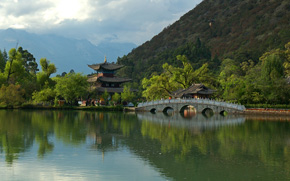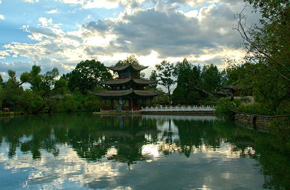 The Black Dragon Pool park is situated on the northern edge of town. It is also called "The Black Dragon Pond". As the water is as green and lucid as jade, the pond is entitled "Yuquan" or Jade Fountain. The entire park is green with grass and shaded by swaying willow trees. On the bank of the pond willows hang their withes like silk thread. One can see arbors and pavilions beside the pond, temples hidden in the trees and variegated flowers found everywhere. "A tree of cherry blossom accompanies a tree of willow, while a rose climbs to the tip of one of a tree's twigs." That is how the calm and exquisite view of the place is described. Under the Shuocui Bridge, a waterfall creates a constant roar as it cascades downstream.
The Black Dragon Pool park is situated on the northern edge of town. It is also called "The Black Dragon Pond". As the water is as green and lucid as jade, the pond is entitled "Yuquan" or Jade Fountain. The entire park is green with grass and shaded by swaying willow trees. On the bank of the pond willows hang their withes like silk thread. One can see arbors and pavilions beside the pond, temples hidden in the trees and variegated flowers found everywhere. "A tree of cherry blossom accompanies a tree of willow, while a rose climbs to the tip of one of a tree's twigs." That is how the calm and exquisite view of the place is described. Under the Shuocui Bridge, a waterfall creates a constant roar as it cascades downstream.
At the far side of the pool, there are renovated buildings used for art exhibitions, the Moon-Embracing Pavilion with its own white marble bridge across the water, and the Five-Phoenix Temple built during the Ming Dynasty (1368-1644 AD).
 In a renovated complex on the hillside, there is the Dongba Research Institute and a small museum with Dongba scrolls and artifacts on display, including such invaluable treasures as the "Dongba Scroll Painting" and the "Art of Dongba Painting." Dongba culture originated in the primary polytheistic Naxi religion, which incorporated elements of Lamaism, Buddhism and Daoism. The Dongba scriptures comprise a series of more than 20,000 books done in Naxi pictographs along with more than 2,000 hieroglyphs - a form of writing invented by the Naxi people more than 1,000 years ago. The name itself, Dongba, is the name applied to the shamans of this culture - wise men who combined the functions of witch doctor, scholar, craftsman, and artist. So far, 1,500 volumes have been translated at the Dongba Research Center in Dayan. Some have been published. These works are important ethnographic texts, providing some of the only information about the history, language, and social and religious customs of the Naxi people. In recent years, more and more domestic and foreign scholars have come to Dayan to use the facilities of the institute for research projects about the Dongba culture.
In a renovated complex on the hillside, there is the Dongba Research Institute and a small museum with Dongba scrolls and artifacts on display, including such invaluable treasures as the "Dongba Scroll Painting" and the "Art of Dongba Painting." Dongba culture originated in the primary polytheistic Naxi religion, which incorporated elements of Lamaism, Buddhism and Daoism. The Dongba scriptures comprise a series of more than 20,000 books done in Naxi pictographs along with more than 2,000 hieroglyphs - a form of writing invented by the Naxi people more than 1,000 years ago. The name itself, Dongba, is the name applied to the shamans of this culture - wise men who combined the functions of witch doctor, scholar, craftsman, and artist. So far, 1,500 volumes have been translated at the Dongba Research Center in Dayan. Some have been published. These works are important ethnographic texts, providing some of the only information about the history, language, and social and religious customs of the Naxi people. In recent years, more and more domestic and foreign scholars have come to Dayan to use the facilities of the institute for research projects about the Dongba culture.

